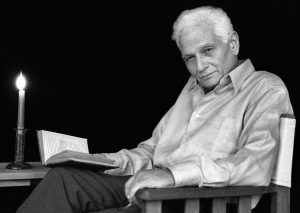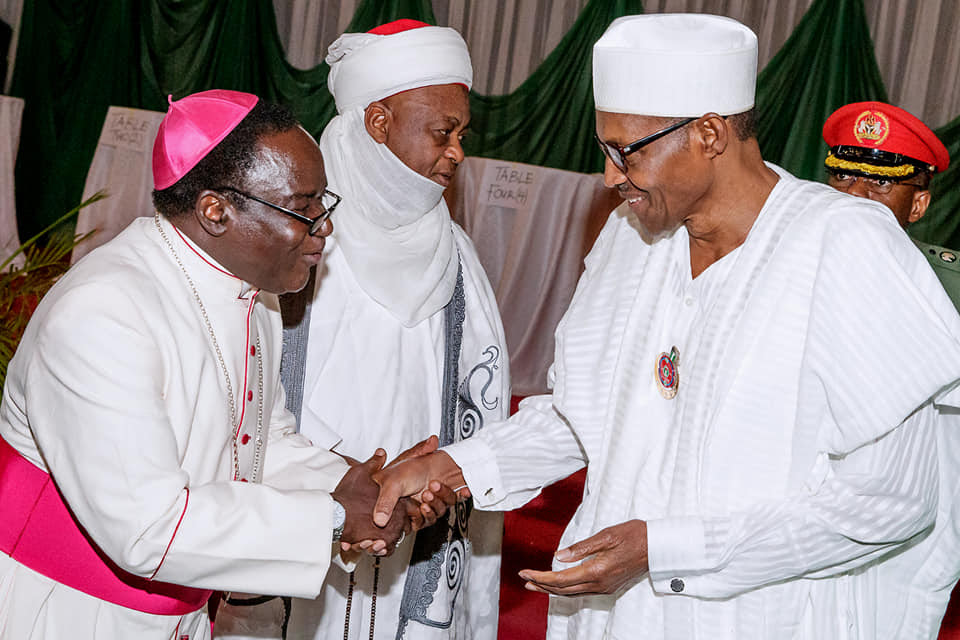It is not clear if Mathew Hassan Kukah, the Catholic Bishop of Sokoto Diocese, is a student of French philosopher, Jacques Derrida. He is unlikely to be but he has done what Derrida thinks is the only way to get at the truth: deconstructive reasoning. That is, if you want to get at what anything means, take it as a text that can be opened and read as such to see where and how that text is at war with itself. Derrida’s assumption is that every reality, be it the Government of the Federation or the entity called Nigeria or even the world itself, is at war with itself because every such reality is a construction. And those who constructed every such reality or text did so by privileging certain layer(s) of meaning while excluding other layers, a process for which there were no objective reasons that would explain what was privileged and what was not.

Jacques Derrida
It has turned out that everyone agrees with Derrida or we would not have the saying that an unexamined life is not worth it. Self or group re-examination is deployment of deconstructive reasoning whether we are conscious or unconscious of that. The implication is that it is a consensus that taken-for-granted meaning or referentiality is not good for the health of any society. And any interruption of referentiality is, therefore, good.
So, deconstructive reasoning rather than rational sense making is not about destroying a particular construction or reality but about unpacking and re-packing. The problem with unpacking an entity is that the outcome could be unsettling. But, in a world of multiple meanings, an unsettling interpretation is only unsettling but not criminal or subversive.
Those who are, therefore, commending or condemning Bishop Kukah are enemies of progress. That is not what the country needs because, even as uniquely underdeveloped as it is, Nigeria is not a 12th century hamlet. It is still an aspirant to modernity dictated by the imperative of arriving at ‘truth’ through multi-vocal reading of reality rather than beholding to so-called unshakeable grounds.
So far, that is what is happily going on with the entertaining deconstruction of Kukah over his own interruption of referentiality with his 2020 Christmas message, with vigorous debaters on both sides of the coin. One could see The Presidency, the Tiv Youth Council Worldwide, the MURIC, BMO, the Arewa Youth Consultative Assembly and sundry other platforms on one side and the Catholic Church, the Southern/Middle Belt Leaders coalition, the Northern CAN and many individuals on the other side.
It is in that debate that the seeds of the new Nigeria are being planted. Anybody who habours the notion that there are certain things that cannot be said is hopelessly mistaken. Again, Nigeria has passed that stage. Similarly, those who enter the fray by calling for extra-ordinary measures against Kukah are also guilty of securitising practice and are hereby ruled out of order. The challenge of Kukah’s interruption is more and more conversation over it under a condition whereby taken-for-granted meanings are exploded and dispensed with. Anyone who still finds doing that to be a strange practice should stay out of the debate. All those who have the attitude of endorsing or kicking against what the Bishop has said also deserve to make their exit from the heightened conversation. Nigeria needs more than such rule of the thumb attitude. The unmaking of Nigeria was accomplished by the idea of ‘no-go’ areas. The re-making of Nigeria will be accomplished by the abolition of such restrictions. More so that Nigeria is witnessing an era of aggravated fragmentation and experiencing a slow motion to an unknown destination, a proper deconstruction of which is the only way out. What that means is that those who come clapping or condemning Kukah might be disappointed at the end of the day because a proper deconstruction of Nigeria of today may not support their current standpoint.
The debate should go on. All voices must be heard if the nation is to make progress. What is bad is saying that certain views should not be expressed because of what they connote or denote. Progress would be impossible if a nation works on such a principle because what Kukah or anyone for that matter says doesn’t automatically translate to any effects in itself. It still has to compete with contending narratives to be performative. That is how it is said that there is power in discourse or that discourse is constitutive of power and that power decides the truth. Yes, discursive power decides the truth because any narrative that establishes itself as the most commonsensical in the mélange of narratives becomes the frame of reference for collective action. There lies the import of the kind of conversation going on now over Kukah’s intervention. In other words, it would have been more worrisome if Kukah hadn’t said anything.

Alawys as friends at the level of the elite

Faith, leadership and policy in action?
All that is needed is to also apply deconstructive reasoning to Kukah’s own Christmas message to see where it is at peace with itself and at war too with itself. This is as Kukah’s message could not have been put together without privileging or suppressing one set of ‘truth’ or the other. There is, therefore, no one, single, ordained or permanent meaning or truth in what His Lordship has said as to upset anyone.
For instance, in a similar situation a decade ago, President Buhari himself said something whose meaning today is different. The first two paragraphs of the March 10th, 2010 story filed by Emeka Mamah, for Vanguard, for instance, goes as follows:
Former Head of State and Presidential candidate of the All Nigeria People’s Party, (ANPP), in the 2007 Presidential election, Major-General Muhammadu Buhari, has said that the only option to the present political logjam in the country was for the National Assembly to start impeachment processes against ailing President Umaru Yar’Adua.
Buhari spoke while addressing members of the National Unity Forum, (NUF) who paid him a courtesy visit in Kaduna yesterday. He, however, said Yar’Adua could save himself from ridicule of impeachment by resigning from office honourably”.
The meaning of that statement then and now would be completely different. So, meaning changes. If meaning is what is unsaid, then Kukah has only asked us to go on a deconstructive excursion. Anybody or groups coming up to make a truth claim about the Kukah statement is simply on a mission of falsehood.
The world has no known mechanism for detecting the truth yet since 1643 when Rene Descartes declared reason to be such mechanism but only to instigate a debate which is yet to be resolved to this very moment regarding what truth may look like. Deconstruction can reach the truth but it is just one of the many, many truth claims.
The tragedy in this particular case is in how those who should clap hands for His Lordship for his unintended but privileged and rather mystifying subject positioning of them are those shouting crucify him!, crucify him! while those who should be sad for the opposite reason are those jumping up and down in celebration. It isn’t that people are not educated enough to be able to see such gaps. It is that we are all victims of Western metaphysics. It is also that while the West has discovered the limits of Western metaphysics and is rolling it out vigorously, we here are just consolidating our application of the categories of classical Western philosophy, calling ourselves realists in making sense of our everyday lives. As such, we don’t even know, much less care about what our universities should be doing in helping us to get out of this constraint and if they are equipped to do that. So, we berate ASUU for incessant strikes because we don’t seem to have the capacity to see beyond what meets the eyes.
Before someone comes up with asking if Jacques Derrida is not a Westerner, let it be quickly said that he is but the provocation for his philosophical system is completely African and the idea of deconstruction as articulated by him sits very well with the Idoma world outlook, for instance. Idoma is just used as an example here but it would not be different with all other ethnic groups across Nigeria when studied from the point of view of their popular culture. There is not a single folk saying in Idomaland that doesn’t agree with his philosophical system. But it is easier for one to discover this in a European university than in a Nigerian university, with the possible exception of the Institute of African Studies at the University of Ibadan. So, it is still a long way to liberation.




























